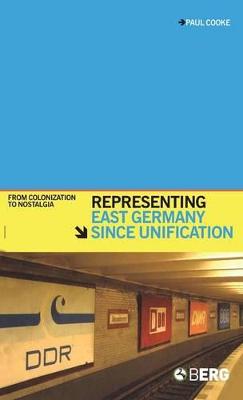
Representing East Germany since Unification: From Colonization to Nostalgia
(Hardback)
Available Formats
Publishing Details
Representing East Germany since Unification: From Colonization to Nostalgia
By (Author) Paul Cooke
Bloomsbury Publishing PLC
Berg Publishers
1st September 2010
United Kingdom
Classifications
Tertiary Education
Non Fiction
306
Physical Properties
Hardback
256
Width 138mm, Height 216mm, Spine 19mm
Description
When the Berlin Wall came down and the two Germanies were reunited, culture was held up to be one of the keys to national unity. Ironically, however Cooke argues it is the realm of culture that, at times, has most clearly demonstrated the continued divisions between East and West. Taking culture as broadly defined, this book examines state memorialisation, literature, television, film, and the internet, to map out the problematic path of German national identity as it struggles to deal with the legacy of division. Drawing on postcolonial theory, the author examines the contention that the East has been colonized by the West, looking at how such perceptions have pervaded both east and west German culture. Cooke also discusses the complex phenomenon of nostalgia for East Germany, as evident in the recent international hit film Good Bye, Lenin! Rich in detail and first-hand accounts, this book provocatively asks how far East Germany can be read today as a postcolonial culture.
Reviews
'Paul Cooke's stimulating study of post-unification German culture illuminates the interrelationship between literature, film, television and the internet as communicative forms. It shows how the changing representation of East Germany, viewed both as an historical reality and a 'discursive space', has become a key indicator of Germany's progress towards the elusive goal of inner unity.' Dennis Tate, Professor of German Studies, University of Bath. 'A highly original and outstanding book. The idea of analysing Germany's post-unification developments under the rubric of post-colonialism is daring indeed, and likely to promote much discussion and debate.' Bill Niven, Nottingham Trent University 'Cooke offers original and stimulating analysis of the full array of East German culture since unification and presents important new perspectives on recent literature, film, television, and websites-all of which the reader will find judiciously placed within the wider political and historical context. While treating serious matters, Cooke manages a light touch: this is an extraordinarily lucid study, and a real pleasure to read. Even those already familiar with the subject will find a great deal that is new here.' William Collins Donahue (Rutgers University-New Brunswick), author of The End of Modernism: Elias Canetti's Auto-da-F. 'This is a useful and interesting book.' Journal of Contemporary European Studies 'Paul Cooke's timely and immensely readable book offers a rich account of cultural life since unification, which is made the richer for its inclusion of innovative studies of television and the Internet and insightful readings of film and literature. It will undoubtedly be extremely useful not only for scholars and students of German Studies but also for students of Cultural Studies, Critical Theory and European Studies.' LIMBUS
Author Bio
Paul Cooke is Senior Lecturer in German Studies at the University Leeds.
